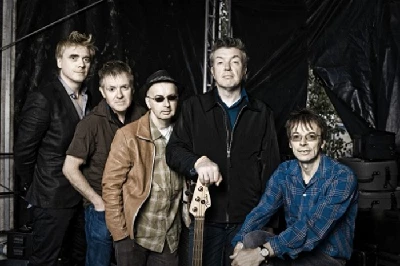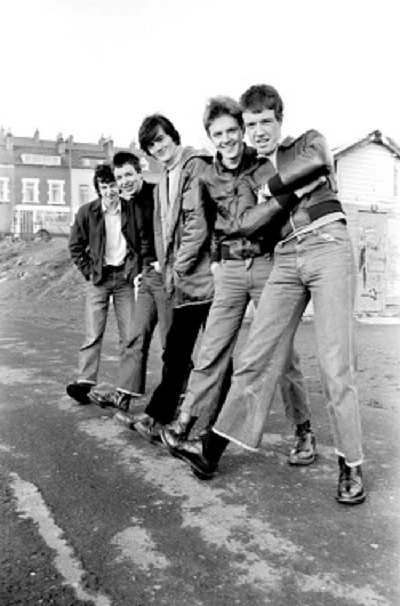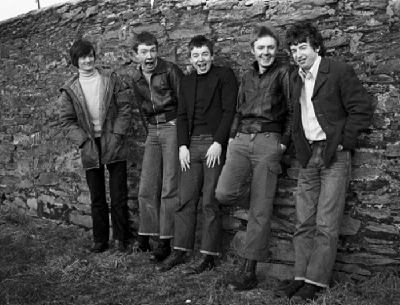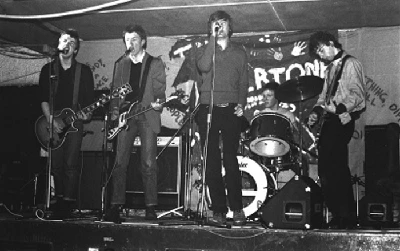published: 25 /
5 /
2013
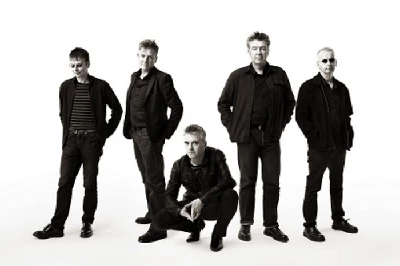
Denzil Watson speaks to John O' Neill, the guitarist and main songwriter with influential late 70's/early 80's punk/new wave band the Undertones, about his band's career and their latest compilation album
Article
He has written some of the best songs from the late 70’s and early 80’s punk/ new wave scene. He's been in bands with his younger brother Damian for decades, including politically charged post-Undertones, agit-popsters That Petrol Emotion, and is now back with the reformed post-Feargal Undertones.
He first cut his teeth as rhythm-guitarist for Derry punk hopefuls the Undertones back in 1978, and, while the band were more feted for the warbled vocals of their distinctive frontman Feargal Sharkey, it was the modest and unassuming John O'Neill pulling the strings of the band's prolific song-writing talent. Most of the band's biggest hits were penned by O'Neill senior including the legendary ‘Teenage Kicks’ and other hits such as ‘Jimmy Jimmy’ and ‘You've Got My Number (Why Don't You Use It?)’, occasionally in collaboration with brother Damian and bassist Mickey Bradley.
It's now the 35th anniversary of John Peel's favourite ever song. With yet another Undertones greatest hits package soon to be released, Pennyblackmusic caught up with the ever-affable and self-effacing Undertones guitarist on the eve of their UK and European tour.
PB: How are things in the Undertones camp right now?
JO: Fine really. We made a record for Record Store Day. We went over to Toe Rag to make it. The studio in London that's famous for the White Stripes. You know Toe Rag?
PB: It's all traditional recording facilities, isn't it?
JO: Yeah, it's all analogue. That was really good. The last couple of records we have made, we made them here in Derry and it was all done with Protools and that sort of thing, so it was nice to get back to play the songs live and get it all right.
PB: And get back to how you recorded your first single and album, I guess?
JO: Yeah, it was the same process.
PBM: Are you looking forward to your dates in the UK?
JO: We're at Koko in London on Friday and then four more shows in the UK and then four more shows in Europe after that.
PBM: And culminating in two sold-out shows in Germany as special guests as Die Toten Hosen. How did those come about?
JO: Our tour manager/manager Barry lives in Berlin and he's got some good contacts with people in Germany, so we had heard that Die Toten Hosen were fans and so it was in the pipeline that we were going to play with them at some point. They are huge in Germany, so we couldn't really turn them down.
PB: Do you still enjoy playing live?
JO: We don't do it that much, and we'll only do it if it's good fun. Most people have got day jobs, so the only time we can get off is at weekends or holidays. That's what keeps it fresh I think, because we don't play that much. So when we do it's good fun. We just do it as it suits us really.
PB: Do you still get that buzz?
JO: I do. Yes, it's still the best. It's the most enjoyable part of being in a band.
PB: Do you still get the “where’s Feargal” routine or are most people aware of the situation?
JO: At the start we always got that, but now I think everybody's aware that Feargal's not in the band. When we made the first record post-Feargal with Paul [McLoone-Ed], I suppose I kind of hoped that it got a bit more attention than it did. I'm aware that people with the records associate Feargal as the singer, so we're never going to get away from that. I'm sure there's some people who refuse to come and see us because Feargal's not singing and that's fair enough too, but as far as we're concerned the songs are still fresh and good and Paul's a great singer.
PB: In a way you've got the perfect replacement as he sounds like Feargal without trying to and he's probably a better singer too.
JO: He is a better singer because Feargal after the first three or four songs used to struggle to hold a note. Basically he used to be on his knees beside the monitor for two thirds of the set because he couldn't stand up and jump around and sing the songs at the same time, whereas it's never been a problem for Paul. So in that sense he's probably technically better.
PB: I've been having a listen back to the latest compilation and the thing that strikes you is just how little the songs have dated. They still sound very fresh.
JO: I don't know why. A few people have said that. I can't really answer that. We recorded the songs as we thought they warranted. Maybe that's Roger Bechirian (the band’s first producer-Ed)to thank for that rather than ourselves.
PB: If you listen to some music from the 1970s and 1980s it has really dated. But you stick on ‘Teenage Kicks’ or ‘My Perfect Cousin’ and it doesn't sound dated at all.
JO: Well, I suppose that's why there's still so many young people coming to see us. They can still relate to the songs and the sound of the records or something. I don't know. But that's what a lot of people have been saying all the time, which is really nice. Why that is I really can't answer if I'm honest.
PB: I guess it was the things you were writing about then are still as relevant now.
JO: The boy wanting to meet girl and all that sort of thing. Heartbreak and all that sort of thing is universal.
PB: Did song-writing come easy to you back in the late 70s because you wrote a large number of classic songs in a short space of time?
JO: It didn't come easy. I suppose we had the incentive to come up with a new song every two weeks and getting that done was important. I suppose that a lot of those songs did just write themselves for the first record (‘The Undertones’, 1979-Ed), that I wrote, anyway. ‘Teenage Kicks’ wrote itself and I wrote it in about thirty seconds, and ‘Girls Don't Like It’ wrote itself. Some of my favourite songs just wrote themselves. I don't know, I can't explain it.
Not all the songs happened, but many other song writers you talk to say there's almost a magic thing that happens sometimes when you write a song. You work for weeks and weeks and weeks trying to get something, and then all of a sudden you just write the song in a matter of a couple of minutes. And you just ask yourself "Where did that just come from?". I don't know what it is.
PB: How key was it having your younger brother Damian in the band?
JO: Damian is just a phenomenal guitar player. I started playing the guitar when I was about fifteen, and I'd been playing for a year and a half, and Damian decided he wanted to play guitar. The Undertones, even though we weren't called that back then, were talking about having a band with me, Mickey [Bradley-Ed] and Billy [Doherty-Ed] and Damian's other elder brother Vincent. Vincent had to leave the band, and Damian, at that stage, hadn't started to practice playing guitar, and in the space of about six months he was better than I was and I'd been playing for two years. That's how good he was. He was just a natural. He was playing lead guitar. He'd work out solos by ear from a record. I just couldn't figure out how you could do it. He's just a natural musician.
PB: Having seen you both together on stage I don't think I've ever seen two guitarists who are so in sync with each other. It's almost like there's some sort of brotherly ESP between you.
JO: I don't know (Laughs). It's just we know the songs so well and they are that easy to play that you just can’t make mistakes. I think that's what it is.
PBM: Any memories of those first gigs at the Kasbah in Derry back in 1977?
JO: They were just the best memories and the most fun times. Even though we weren't the most original band in the world in terms of our style, no one in Derry was playing songs like what we were playing. We were playing cover versions of the New York Dolls, the Stooges and the Velvet Underground and T-Rex and writing our own songs.
So, I guess we knew there was something a bit special going on. I may not have thought our songs were that special, but the fact that we were doing something that no one else in Derry was doing kind of gave you something to be proud of. The small core of people that came to see us each time knew that as well. They'd been reading the ‘NME’ the same as we had, and had been reading about the punk movement happening in New York and London. And even before we'd heard the first Sex Pistols record and the Clash, we'd been reading about it and we'd been reading about them being influenced by the Stooges and New York Dolls, and we were playing songs by those bands, and it felt like a great sort of community thing which was fantastic. The best friends I have are from that era. I'm still close to them now.
PB: At the time were you wondering how you were going to make it out of London and over to England and the rest of Europe?
JO: We'd no ambition all. We were just happy doing what we were doing. Just to try and influence our people to just do the same thing. We didn't think we were good enough to get signed up. In fact when we released the ‘Teenage Kicks’ EP as far as we were concerned it would be the only record we ever made. That was as far as our ambition was. Make one record and that's great. We were about to break up.
PB: And then John Peel picked up on it, didn't he?
JO: Well, exactly and then it all became a complete fantasy then. Record companies calling us up and then getting signed to Sire. It just became a complete dream come true. We never in our wildest dreams expected that to ever happen.
PB: Didn't Peel write you a letter to apologise for sitting on your demo tape?
JO: Aye, yeah, that's right, he did. I think Damian has still got that letter. Without John Peel, we wouldn't obviously be where we are. The whole thing with ‘Teenage Kicks’ has taken on a whole new meaning now. It's become this iconic song that people associate with punk. It's all down to John Peel.
PB: So how does it feel to have written one of the greatest songs of all time?
JO: It's not one of the greatest songs of all time. It's because it's John Peel, and I'm proud to be associated with anything that John Peel loved. I know it's not one of the greatest songs. It's a good record.
PB: He paid for you to do a Peel Session back in Derry, didn't he?
JO: Not in Derry, but at a radio station just outside Belfast which is typical of him.
PB: Apparently, according to his biography, he used to always follow ‘Teenage Kicks ‘with another record in order to give him time to “compose himself”. That’s some accolade, isn’t it?
JO: That's amazing. It just obviously struck a chord with him. That is why people love that record as it does have a chord somehow. It's just one of those magic things. You're obviously not the first person to ask me about that, but I can never really articulate what it is. It's just a spontaneous thing that we did. We never thought the song was all that good. When we got sent up the first copies of the EP, we were sort of disappointed about the quality of it. That's how much we knew.
PB: In a way you can become desensitised to it because you hear it a bit too much, perhaps in the same way with say Joy Division and ‘Love Will Tear Us Apart’. Do you ever get sick of hearing it or sick of playing it?
JO: Well, I never play it, obviously. But when I do hear it I can straight away hear what it is that people love about it. I don't think it is a particularly great song, but it's just the sound of the record that just gives it something. There's a kind of rawness about it and an exuberance to it.
John Peel always used to say it has that thing that got him when he was a teenager and he first heard Elvis. And that said, it isn't as good as anything by Elvis, but it is back to the roots of rock 'n' roll. That first thing when you go, "Well, this is what being a teenager is all about." It's about being spontaneous, exuberant and full of life. You know, the record just seems to capture all that.
PBM: It's also been well covered. The list of bands that have covered it stretches Nouvelle Vague through to Jedward, God forbid, and One Direction. What did you think to their version?
JO: I hated it. I'd never heard of them. I got sent an e-mail saying that they were going to use it as a chorus in a Blondie song and was I OK with that. And I asked the wife, "Have you ever heard of a band called One Direction?" as I'd never heard of them. I was very tempted to say no because it was so bad and it will look bad in terms of agreeing to say yes to it, but honestly, in terms of the exposure it was going to get from One Direction I couldn't really say no. It may not be a cool thing to say, but I just couldn't say no.
PB: Okay, so you don't think ‘Teenage Kicks’ is the best song you've ever written. What do you consider, say, the best three songs you have written for the Undertones?
JO: Whenever we play live ‘Teenage Kicks’ is always the song that goes down best. ‘Get Over You’ almost tops it. The recording we made of it was not the greatest recording. We didn't really do it justice, so maybe the record's not so great but that definitely is one of my best songs I think. I think if someone ever did a cover version of that they'd make a better record of it. You could see how good a song that is I think.
‘You've Got My Number’ is another one of my favourites. Again, it's one of our best recorded records. That still sounds very fresh. It could come out now, almost. We just rattled that off in the space of 20 minutes or something, and recorded that song, first take. It was just so easy to play. I really love that song.
And probably, I suppose I'd better mention ‘Julie Ocean’. I was really getting into the third Velvet Underground record. The quiet one with ‘Candy Says’ and ‘Pale Blue Eyes’ on. I was trying to write a song that might have come off that record. And even though it sounded more like something that That Petrol Emotion would have done, I still think it's a good record.
PB: When you look at the songs you had and your chart positions, you didn't really get the commercial success you deserved in a way. It seems ridiculous that you had only one Top Ten hit with ‘My Perfect Cousin’.
JO: Again, we weren't really great at promoting ourselves. Staying in Derry was not a great career move. When we did break up, one of the first things Feargal did was straight away move to London.
But we'd never really had a career plan. I certainly wasn't career influenced, and for me it was all about the music. I hated all that doing interviews and promotions and getting photographed and all that. That said I really detested it. And part of selling yourself and not enjoying that and staying in Derry didn't help our profile very much.
Maybe that's the reason why the songs weren't such big hits because we didn't promote them as well as we could have done. We were asked to do TV shows, and we turned them down because we couldn't be bothered. And that was the kind of thing that frustrated Feargal. And very understandably so, you know. That was the main crux of why he left in the end anyway. By the time of ‘The Sin of Pride’ which sold hardly any records anyway, we knew we were probably going to get dropped anyway.
PB: There are a lot of artists that get over-exposed and they're everywhere. And maybe that's one of the things that endeared you to people was the fact that you weren't over-exposed.
JO: I suppose in that sense I can see what you mean. We weren't exactly the prettiest boys to put on the front cover. I remember me and Damian going over to do what was supposed to be the front cover of ‘Smash Hits’, and it was never used. We weren't front cover material. Maybe that was a good thing, and, as you say, being under the radar made us seem a bit more mysterious or cooler than we actually really were.
PB: At the time you got lumped in with the punk thing. Did you see yourself as a punk rock band or more of a new wave band back then?
JO: We always regarded ourselves as a punk band. We may not have had all the obvious punk things, all angry sort of thing. I remember at the time there were punk bands and new wave bands, and sometimes we'd be lumped in as a new wave band, and we hated that.
We always regarded ourselves as punk because of our attitude which was punk. Joy Division were a punk band as far as we were concerned, because of their attitude. We may not have been as original as Joy Division, but we still thought we were part of the punk movement.
PB: Which of the punk bands did you have the strongest affinity with?
JO: I suppose the Buzzcocks at the time because of the pop influence. They were probably our favourites. Take, for example, ‘Everybody's Happy Nowadays’. I wrote ‘You've Got My Number’ two weeks after I first heard it. I thought I've got to write a song as good as that. Whenever they brought out a record, they were the band that I closely listened to to try and see and try and do something and attempt to do a record as good as that. The Buzzcocks were probably the English band that were the biggest influence.
Also The Ramones were our biggest influence. We tended to pay more attention to the American punk stuff as opposed to the English punk. Much as we loved the Clash and the Sex Pistols, there was always that fashion element that we didn't relate to, while the New York bands just tended to wear jeans and T-shirts. And just dressed in their normal clothes sort-of-thing. We related to that more.
PB: Any particular memories that stick in your mind from touring from that time?
JO: We didn't really tour with that many bands. When we first came to England we toured with the Rezillos. That was great, but they broke up. I remember the rows from the hotel. You'd hear the rows in the hotel and you knew there was something not right happening here, and they broke up half way through that tour. And funnily enough we got to play with Joy Division for a couple of shows which was great.
PB: Were you a fan at the time?
JO: Absolutely. We saw them, and they were getting booed and spat at at the start as well which was interesting. We were going, "They're really so amazing this band are," but because they weren't, you know, obvious fast chords and all that sort of thing they were originals to us anyway. The two shows we played with them, they were virtually booed off at both shows.
PB: Was that in 1979?
JO: That would be 1978.
PB: Just coming back to the new compilation, 'An Introduction to the Undertines'. I think it's the ninth "Best of" album by the Undertones.
JO: I know. It's slightly embarrassing that.
PB: But it does come with some quite special stuff on the accompanying DVD, doesn't it?
JO: Yeah, so I've just heard. I didn't realise that until somebody just told me that. No, it's a good sort of introduction if you are people who don't know much about us. It's a good starting point anyway.
PB: It's got the film ‘’Teenage Kicks: The Story of the Undertones’ on the DVD. That's not the one the BBC made recently, is it?
JO: No, that's not the BBC one. It's the one that was made earlier by some friends of ours in Derry.
PB: I know with the BBC film Feargal was asked to take part in it and he declined. Is he on this one?
JO: He is. Yeah, he's on that one.
PB: Have you talked to him since the band split?
JO: Nah, no. When we broke up, he kind of severed all ties. He didn't really have anything to do with us.
PB: Do you find that kind of strange given you used to live in each others’ pockets and see each other every day?
JO: No, not really. You see, there was always the four of us and Feargal. And it was always like that from the start. You remember me saying earlier we were going to break up after the ‘Teenage Kicks’ EP came out, and there were tensions even then. Feargal wasn't really into music the way we were. He tended not to have the same enthusiasm.
I remember one of the great things being on tour in the later 70s was I was really getting into Northern Soul, and we'd always stop off in the likes of Wigan and these places and go to great record stores. I would save my PDs just to go into these record shops and spend it all on singles, obscure Northern Soul singles and stuff. And Feargal would just stay in the van. You know, that just kind of summed it up.
PB: If the Undertones hadn't become famous would you have just played in bands anyway?
JO: I think so. I don't know. I was never all that great guitar player, so I would have probably got frustrated. In fact I used to get more into being a roadie than being on stage if I'm honest. I loved all that side of it. The kind of backstage thing. So, I probably would have been a roadie for someone. Something like that, you know.
A couple of times we played the Kasbah I didn't play because I wanted to see the band playing live. I tried to persuade them so many times that they were better off without me. I would have been quite happy writing songs and being a roadie. But I was never allowed, you know.
PB: You're a very modest man, John.
JO: No, that's the reality. I'm the one that makes the most mistakes when we play live, right to this day. I'm not a natural musician like the rest of the band. The band are. I always have to work and work and work at it, and I still make mistakes.
PB: I guess with That Petrol Emotion you did get the chance to take a step back and watch the band play as you left just before ‘Chemicrazy’ [the band's 1990 fourth album-Ed], didn't you?
JO: Yeah, yeah, and that's probably their best record. We were living in London at the time, and the wife wasn't really happy and wanted to go back to Derry, and our daughter was nearing school age. My wife wanted to be around our cousins and our second child was born also, so it would be easier.
There was talk of the band going away to Australia for a tour for six weeks and it was at that stage that I thought I'd be holding the band back, so I decided to leave the band. Ciaran [McLaughlin, drummer-Ed] and Raymond [Gorman, guitarist-Ed] were writing more songs anyway, so I knew they were going to be fine.
PB: I think I saw you quoted somewhere saying you enjoyed being in the Petrols more than the Undertones.
JO: I really did. We were really more friends. The four or five of us were all into the same music, same films and same books. It was a great camaraderie the whole time.
PB: The debut album 'Manic Pop Thrill' still stands up well, doesn't it?
JO: Aye, I still have great memories making that record. Really great fun.
PB: Do you think you'll ever play again with That Petrol Emotion again?
JO: They did reform for a few shows the last couple of years, but it'll not be with me. It'll be with the last line-up with Damian on guitar and Brendan on bass. That's the best line-up.
PB: Thank yu.
Band Links:-
https://www.theundertones.com/
https://www.facebook.com/OfficialTheUn
https://twitter.com/TheUndertones_
Picture Gallery:-
